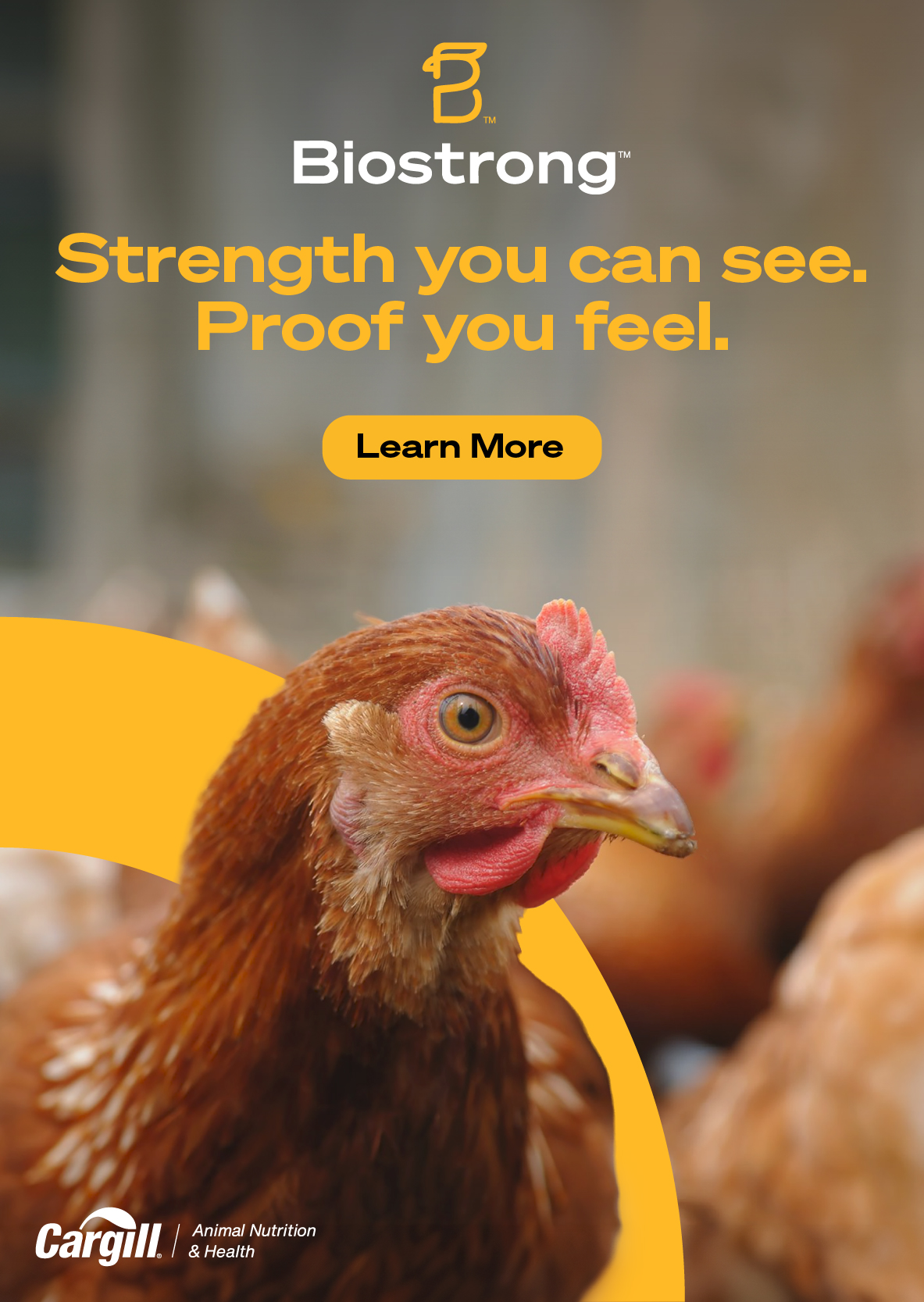From supporting poultry health to improving bird growth and production efficiencies, phytogenic feed additives can offer a range of benefits to poultry production systems.
Megan Koppen, US poultry technical manager with Cargill, explains what phytogenics are and why they can be a valuable addition to broiler, layer and turkey diets.
What are phytogenics?
Koppen:Phytogenics are natural compounds found in plants like essential oils, herbs, spices and saponins.
When used in specific combinations and added to poultry diets, research has shown that some phytogenics can improve palatability and feed efficiency, and support bird gut and immune health.
Can you tell us more about these phytogenic compounds?
Koppen: There are a variety of phytogenic compounds found in a wide range of plants: Essential oils, for example, are extracted from aromatic plants like oregano, mint and thyme, while fruits, nuts and certain tree barks are good sources of tannins.
Dried herbs including garlic, turmeric and ginger also contain phytogenic compounds, while compounds such as flavonoids and polyphenols are found in fruits and vegetables.
Other compounds include alkaloids, which are found in some plants like yucca and capsicum, and saponins, which are found in plants like alfalfa, fenugreek and quillaja, a tree native to Chile.
Some of these compounds are being utilized in livestock systems, including in poultry production, as a way to improve feed palatability and digestion, while producers are also utilizing the antioxidant and antimicrobial properties some compounds offer.
How are phytogenic feed additives produced?
Koppen: After they are cleaned, plant materials can be dried or go through an extraction process such as steam distillation, solvent extraction or cold pressing.
After extraction, the crude extract is often purified to remove impurities, and the remaining extract is formulated into powders or pellets.
Throughout the production process it’s important that quality-control measures are in place to ensure the consistency and potency of the final product.
Analytical techniques such as high-performance liquid chromatography and gas chromatography-mass spectrometry are used to identify and quantify the specific compounds present in the phytogenic extract.
How can phytogenic feed additives improve poultry production systems?
Koppen: Research has demonstrated that the bioactive compounds in phytogenic products offer a variety of benefits that can have a direct impact on poultry health, growth and production efficiencies.1
Some phytogenics have been found to stimulate the production of digestive enzymes and improve nutrient absorption, which can lead to better digestion and improved growth rates and production performance.
Certain phytogenics can also affect microbial populations supporting gut microbiota. This can lead to lower populations of pathogenic bacteria, ultimately creating a healthier gut environment.
Some phytogenics also have stress-reducing properties that could help birds cope with stressors like transportation and disease.
Finally, the aromatic compounds in phytogenics can enhance the flavor and aroma of feed, encouraging feed intake, and they could also improve egg quality and shell strength.
Could phytogenic feed additives help reduce the use of antibiotics in poultry production?
Koppen: Potentially, yes. By supporting bird immune systems, they can help flocks be more resilient to challenges, which helps with antibiotics use and creates more sustainable poultry businesses.
When should phytogenic feed additives be fed to poultry?
Koppen: With all phytogenic products, the timing of application is important as they can take time to have an impact on the bird’s system and provide the most efficacy. We recommend feeding most phytogenic products from day of placement, but dosage can vary on the species and product being used.
Phytogenic products designed to enhance digestive functions, such as those developed by Delacon®, a Cargill brand, have been formulated in rations in order to help improve performance and reduce feed costs.
Research has indicated there is value in using phytogenics throughout the grow-out cycle, and not just through the starter and grower phases. This gives producers greater flexibility, particularly when agricultural markets are volatile.
Are all phytogenics the same when it comes to quality and their potential benefits?
Koppen: Not at all. Their effectiveness varies on a number of factors, such as the specific compounds they contain, the plant sources, the type of extraction methods used and the way they interact with other components in livestock diets. The amounts of actives in plants can even differ because of their geographic location, the weather and point in their lifecycle they’re harvested.
Essential oils, flavonoids, tannins and saponins all have distinct properties that can contribute to various benefits, so the composition of a phytogenic product determines its potential benefits.
The concentration of bioactive compounds in phytogenics can also vary; the dosage needs to be appropriate if they’re to support flock health and productivity in the most effective way. Ensuring you have a high-quality product is key to ensuring it performs every time you use it.
How does Delacon ensure the quality of its phytogenic feed additives?
Koppen: We begin by only sourcing high-quality ingredients from trusted suppliers, and we test those ingredients throughout our production process.
Our quillaja saponins, for example, are sourced from a company partly owned by Cargill, which gives us a unique opportunity to control our supplies and collect data on the saponin content.
Taking into account the various factors that can impact a plant’s saponin yields is really important. Because we test it regularly, we’re confident in our ability to source a premium ingredient with a consistent saponin content.
During manufacturing, we carry out a number of checks to ensure our products are consistent. Alongside standard industry assurance measures we carry out batch-based analysis of raw materials, premixtures and finished products.
Every important ingredient is checked twice, and we also carry out regular in-house checks of methodology and equipment. On average, each product is checked on 10 different parameters before it is shipped to the customer.
This regular testing means we’re very confident in our ability to produce consistent, effective products, and that’s what makes us different.
For more information regarding phytogenic and Delacon products, visit Cargill Animal Nutrition’s website or contact your Cargill representative.
1 Results presented by Caroline Donaldson at the XIXth European Symposium on the Quality of Eggs and Egg products and XXVth European Symposium on the Quality of Poultry Meat. Krakow, Poland, 2021.
Editor’s note: Content on Modern Poultry’s Industry Insights pages is provided and/or commissioned by our sponsors, who assume full responsibility for its accuracy and compliance.








